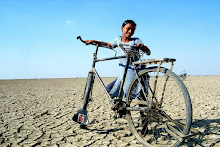In Gujarat’s Little Rann of Kutch, Agaria salt farmers toil under the desert sun, eight months a year, with no homes, water, or basic ameneties.
 |
| Salt workers harvesting salt crystals under the scorching sun of May, with temperatures touching 45 degrees Celsius. Photo Credit: SUCHAK PATEL |
At a civic function in Gandhinagar, Gujarat, in October 2022, President Droupadi Murmu said Gujarat produced 76 per cent of the country’s salt and added in a lighter vein that it could be said that “the salt produced in the State is consumed by all Indians”.
For eight months each year, from October to June, the Agaria migrate with their families to the desolate Rann, living in makeshift huts without roads, electricity, water, and other amenities. Their lives revolve around salt: drawing brine from wells, filling shallow pans, and waiting under the burning sun until crystals form. Entire families, including women and children, live in isolation, surrounded by nothing but salt-pans and the desert horizon. It is a life of extreme heat, loneliness, and hard labour, where generations have poured their sweat into the salt that gives flavour to our food.
This invisible struggle came into focus recently through the singer Aditya Gadhvi’s hit song “Meetha Khara”. Released on September 9, 2025, the song has already crossed five million views. The haunting lyrics give voice to the Agaria’s life experience: “I let my bones melt so [that] no plate is left without salt. While the world savours thirty-two flavours, salt is the only taste I know.” More than just a song, it is testimony to how generations of salt workers have given their lives so that ours may taste better. Yet, the hardships of the Agarias remain largely unknown.
Makeshift homes under a burning desert sun
The Irish novelist George Augustus Moore once wrote: “A man travels the world over in search of what he needs and returns home to find it.” But for thousands of Agaria salt workers, home is a fragile hut in the middle of the Little Rann of Kutch for eight months in a year. Built from bamboo, plastic sheets, and cloth, these shelters, often far from their own villages, offer little protection from the scorching heat, biting cold, or strong desert winds.
Perhaps nothing captures their situation better than the song “Zero BHK Bungalow” by Charul and Vinay:
“Zero BHK bungalow, my 9 feet by 9 feet bungalow
Zero BHK bungalow, my 9 feet by 9 feet bungalow
Neither 3-star, nor 5-star, not even a 7-star bungalow
In the middle of the night if you look up, it’s a million-star bungalow
A bungalow without roof, a bungalow looking up at the sky.”
The PAC report noted that in 2014 the State-Level Empowered Committee (SLEC) promised to provide proper accommodation for salt workers. Yet, an audit by the Accountant General in 2019 found that no such scheme was ever launched. Between 2014 and 2018, Rs.128 crore was allocated for the welfare of the Agarias; Rs.34 crore of this amount remained unused. But though the rest of the amount was spent, not a single housing-related project was taken up, the Comproller and Auditor General (CAG) report pointed out.
Gaps in childcare
A report in 2014, by the Justice M.B. Shah Commission appointed by the Gujarat government, highlighted severe gaps in childcare among the Agaria community in Gujarat’s desert regions. Hundreds of children under 6 lack access to nutritional support due to the absence of anganwadi centres. The report noted that critical services under the Integrated Child Development Services (ICDS) supplementary nutrition, immunisation, health check-ups, referral services, preschool education, and nutrition and health education are largely unavailable to Agaria families, leaving children and mothers at high risk of malnutrition.
The 2020 CAG report corroborated these concerns, noting that between 2014 and 2019, not a single proposal was submitted to the SLEC for extension of ICDS coverage to salt worker families. While most village clusters were included under ICDS, desert areas in Patan, Amreli, Surendranagar, and Kutch were largely left out. Of these districts, only Patan provided weekly take-home rations via special vans.
The Women and Child Development Department failed to implement repeated directions from the District-Level Empowered Committee between 2016 and 2018 to start mobile anganwadis, leaving children and mothers underserved.
The PAC report notes that the department received administrative approval in 2020 to set up 15 tent-based “Rann Anganwadis” for migrant families. Out of these, 7 are currently functional, serving 116 beneficiaries from September/October to June: they provide hot milk, breakfast, lunch, and take-home rations. The committee has recommended that mobile anganwadis, as many as possible, be established with adequate staffing and budget allocation to ensure that all services under the ICDS reach Agaria children and mothers.
Health in general is a cause for concern. Work sites of salt workers lack medical facilities, and the PAC has called for better health services. The health department told the committee that 12 mobile health units (MHUs) were operating to serve the community, but the PAC recommended that all 16 districts with large Agaria populations should have at least 1 MHU each. It also urged that community health centres, primary health centres, and sub-centres in these areas be properly staffed and stocked with medicines and equipment. Additionally, the committee suggested that salt lease agreements mandate lessees to provide medical facilities, group insurance, and regular vaccinations for the workers.
 |
| Makeshift huts that house Agaria families in the desert for eight months of the year. | Photo Credit :SUCHAK PATEL |
Sanitation and health remain areas of concern
CAG reports have also flagged serious gaps in sanitation, health, and welfare provisions for salt workers. An audit of the standard salt lease terms prescribed by the Industries and Mines Department in October 2010 revealed that lease holders are not required to provide medical aid, first aid, or group medical insurance to workers. There is also no mandatory provision for inoculation of workers and their families against cholera, plague, or smallpox.
Sanitation remains a critical issue. None of the 17 salt units in Bhavnagar and 9 units in Kutch visited during joint audits in 2019 had toilet facilities, leaving workers, especially women, without privacy or basic hygiene. The audit noted that neither the Industries and Mines Department nor the Panchayat and Rural Development Department took the initiative to make sanitation mandatory in lease agreements, leaving the responsibility entirely unassigned.
Issue of safe drinking water
The PAC has also urged the State government to ensure safe and adequate drinking water for the Agaria community. The CAG, in Report No. 3 of 2020, flagged district-wise failures in providing water to salt workers despite repeated allocations and proposals.
 |
| The Agaria make do with scarcely any amenities during their long stay in the desert when they harvest salt. Here, a portable LPG cylinder that is used to make tea. | Photo Credit: SUCHAK PATEL |
In Kutch, the Vira-Sanghad Water Supply Scheme, launched in 2007 at a cost of Rs.99.39 lakh to serve 4,000 salt workers, largely failed. Despite additional work on the project between 2012 and 2018 at a cost of Rs.72.11 lakh, the scheme delivered only 59 lakh litres of water against a requirement of 3.95 crore litres. Salt workers in Sanghad and nearby areas continue to rely on wells with high salinity for drinking water.
Bhavna Harchandani, a social anthropologist whose doctoral thesis explored the lives of the Agaria community, said: “Since the time of Sanat Mehta as Finance Minister in the 1990s, there have been plans to provide water to the Agaria. But these plans were never materialised, and the Agaria still depend on water tankers and other temporary alternatives.”
Jog said: “Every year, the district administration arranges tenders for water tankers. The problem is that large tankers cannot enter the desert at the start of the season because of waterlogging from the monsoon. This forces the Agaria to use contaminated water.”
She added that her organisation keeps demanding that the administration include provisions for small tankers in the tenders and ensure water supply so that each family receives water at least once a week. Currently, many families get water only once in 20 days.
Economic and physical exploitation
The report of the Justice M.B. Shah Commission highlighted the economic and physical exploitation faced by salt workers: “The economic and physical exploitations by moneylenders and traders make their condition worse. The indebtedness and market practices have converted Agaria from primary producers to wage labourers.”
 |
| Agaria women carrying wood for fuel in the Little Rann of Kutch, a file photograph. Basic amenities remain largely unavailable to Gujarat’s salt-pan workers. | Photo Credit: PRAKASH HATVALNE/AP |
The availability of highly subsidised solar pumps has improved the economic situation of the community to some extent, research by this writer showed. The PAC report also observed that these pumps led to savings of Rs.1.5 to Rs.2 lakh in diesel expenses in a season for an average Agaria family.
No access to formal credit, no assurance of fair pricing
Many other economic challenges remain, particularly relating to access to formal credit and fair pricing for salt. The PAC recommended that salt farmers be provided access to financial credit from nationalised banks and government financial institutions to cover the cost of salt production and said farmers should receive a fair price for the salt they produce.
Harchandani said: “In farming, there is the concept of minimum support price. But despite salt being an essential commodity, salt farmers do not get the benefit of MSP or any similar system to ensure reliable income. They also lack access to formal credit, forcing them to depend heavily on moneylenders.”
Jog said: “The Agaria salt workers are not covered under the PM Fasal Bima Yojana, a crop insurance scheme. They are also not covered by the NDRF [National Disaster Response Force] and SDRF [State Disaster Response Force] guidelines, leaving them vulnerable to natural calamities.” She said there should be comprehensive insurance coverage and compensation facility to help the Agaria community cope with such disasters.
Mahatma Gandhi saw salt as more than just a mineral. It was a symbol of self-reliance, equality, and resistance against colonial rule. In the same vein, photographs of polling booths in remote areas regularly pop up in the media come election time, showcasing the reach of democracy into the far corners of the country. Yet, as B.R. Ambedkar noted, economic and social democracy is just as important as political democracy, and for many, it has yet to arrive.
(Suchak Patelis an independent writer and researcher based in Ahmedabad. He focusses on government policy, environmental issues, land conflicts, and infrastructure.)



.jpeg)
.jpeg)
.jpeg)

.jpeg)
.jpeg)
.jpeg)
.jpeg)
.jpeg)

.jpeg)
.jpeg)




















.jpg)
.jpg)
.jpg)
.jpg)












